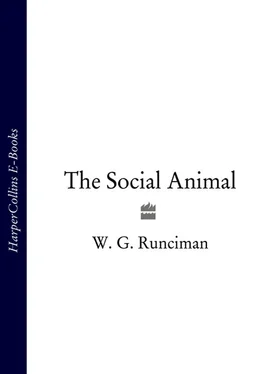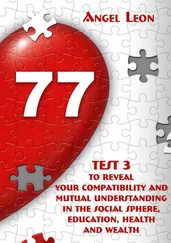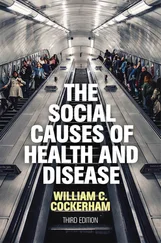THE SOCIAL ANIMAL
W. G. Runciman

Cover
Title Page THE SOCIAL ANIMAL W. G. Runciman
Preface
I: A Very Social Animal
II: What Exactly Do You Want to Know?
III: A Catalogue of Errors
IV: Power
V: Matters of Chance
VI: Structures and Cultures
VII: History
VIII: Ups and Downs
IX: Possible and Impossible Worlds
X: Uses and Abuses
Notes
Index
Other Works
Copyright
About the Publisher
The Social Animal is intended as a short and necessarily selective introduction to sociology for readers who either, on the one hand, are unsure quite what sociology is all about or, on the other, think of sociologists as a bunch of self-appointed arbiters of the existing social order who are neither clever enough to be philosophers nor knowledgeable enough to be historians. I have tried not to exaggerate our achievements or gloss over the controversies that divide us. But my principal hope is that I have managed to convey what a fascinating subject sociology is to work in. This is not only because it’s all about us – human beings, that is – ourselves. It’s also because so much more is now known than even a few decades ago about the remarkable differences and no less remarkable similarities in human institutions and behaviour down the ages and across the globe.
This is, moreover, a particularly exciting time in which to be engaged in sociological research on account of the many advances which are currently being made throughout the behavioural sciences, whether in demography, linguistics, and economics, or in genetics, biological anthropology, and developmental and cognitive psychology. The more dogmatic oversimplifications of Marxism, Social Darwinism, Behaviorism, Structuralism, and Durkheimian cultural anthropology are being left behind; ‘postmodernism’ has come and largely gone, taking with it those aspects of the study of human social behaviour which properly belong with literature rather than science; and a new evolutionary paradigm is beginning to emerge within which historical and cross-cultural hypotheses can be formulated and tested in accordance with standards shared among all the various disciplines involved in explaining why human beings are what they are and do what they do. So to any reader of this Preface who may be hesitating whether to take up a career in academic sociology, my advice is: go for it – there’s everything to play for.
My thanks are due to Patricia Williams for her practical advice and to Stuart Proffitt and HarperCollins for accepting the book, as well as to Geoffrey Hawthorn, Toby Mundy, and David Runciman for valuable comments on the initial draft and to Hilary Edwards for preparing the manuscript for publication. I am also grateful to Oxford University Press for permission to quote from Syme’s The Roman Revolution in Chapter VII.
Trinity College, Cambridge September 1997
IT IS MORE THAN two thousand years since Aristotle said that a human being capable of living outside society is either a wild beast or a god. 1 But what does that mean? What kind of social animal are we?
You, like myself and every other human being in the world, are at the same time three things. First, you are an organism – that is, a living creature born (which not all organisms are) of one male and one female parent from both of whom you have inherited your genes. Second, you are an organism with a brain, and therefore a mind; and although other species have minds too, yours is altogether more complex and sophisticated than the minds of even the cleverest of our close genetic relatives, the chimpanzees. Third, you are an organism with a complex mind living in regular contact with other organisms with complex minds, and therefore you have a social life in which you have relationships with other people to which you and they attach a meaning.
Sociology is the scientific study of human behaviour under the third of these headings. It takes due account of those aspects of human behaviour which are studied by biologists and psychologists. But sociologists are concerned specifically with the groups, communities, institutions and societies in which human beings act out their relationships with each other in accordance with the rules which make them what they are. (Not that all their members follow their rules; of course they don’t. But for the nonconformists to break the rules, the rules have to be there to be broken.) Beneath that omnibus definition, there is obviously room for a large variety of more or less specialized disciplines – sociology of law, politics, education, religion, etc. But if there is a single question in which the subject-matter of sociology can be summarized, it is why the various human groups, communities, institutions and societies which there are and have been in the world are and have been as we find them.
There is no implication in this that the ‘scientific’ is the only way to look at human social behaviour. But it is categorically different from non-scientific ways. Unlike them, it presupposes that the behaviour of groups, communities, institutions and societies can be observed, and the differences between them explained, in terms which can be agreed to the extent that evidence which is there for anyone to see supports the observations and explanations which one or another sociologist has put forward. If you think that this can’t be done, I can assure you that it’s happening every day and ask you to read on. If, on the other hand, you think it puts out of court what philosophers, preachers, and poets have to say about human social behaviour, I can assure you that it doesn’t. The difference is between reports and explanations that you have no choice but to accept, to the extent that the evidence rules out any plausible alternatives, and conclusions of other kinds that you remain free to share on other grounds with your favourite philosopher, preacher or poet.
There are many kinds of human collectivities which sociologists study, some of which we shall meet again: households, families, clans, tribes, sects, classes, castes, armies, schools, clubs, political parties, monastic orders, patron – client networks, voluntary associations, business enterprises, professions, secret societies, trade unions, criminal gangs, pressure-groups and so on and so forth. But common to them all is that their members belong to them in a defined capacity for which the generally accepted term is role. Roles are, so to speak, what they are made of; and to the question ‘what are roles themselves made of?’ the answer is practices – that is, units of reciprocal behaviour informed by mutual recognition of shared intentions and beliefs. Precise definitions of important concepts are not, luckily, a prerequisite of successful explanation in either the natural or the human sciences; the findings quite often come first and the conceptual refinements later. But misunderstandings which are only about words should be avoided if possible; the important point about roles is that they are at the same time performed and occupied, however confusing a mixture of metaphors that may seem at first sight.
In its most familiar sense a role is, as you will hardly need reminding, a part played by an actor: ‘All the world’s a stage,’ says Jacques in As You Like It, ‘And all the men and women merely players.’ So we can all stand back from our various roles and see ourselves performing as sales executives, lieutenant-colonels, godparents, voters, housewives, mafiosi, university students, or whatever. But there is another aspect to it. If we really were ‘merely’ players, we could sign up for our parts as we pleased, and if we didn’t like the script we could turn it down. But we aren’t and we can’t. Take what is for many people their most important role: as wage- or salary-earners, we are paid for the work we do in accordance with rules which are not of our own making. We may be able to change from one employer to another, and some of us may not need to work for our living at all. But we don’t decide the legal and customary framework within which we and our employers operate any more than churchgoers decide the rituals and doctrines of the religion to which they belong or electors decide the constitution under which they vote their politicians into office. Real-life roles, in other words, are governed by rules which the people who occupy and perform them have no choice but to take as given – even if they would like, and accordingly sometimes try, to change them.
Читать дальше





![О Генри - Социальный треугольник [The Social Triangle]](/books/405340/o-genri-socialnyj-treugolnik-the-social-triangl-thumb.webp)







